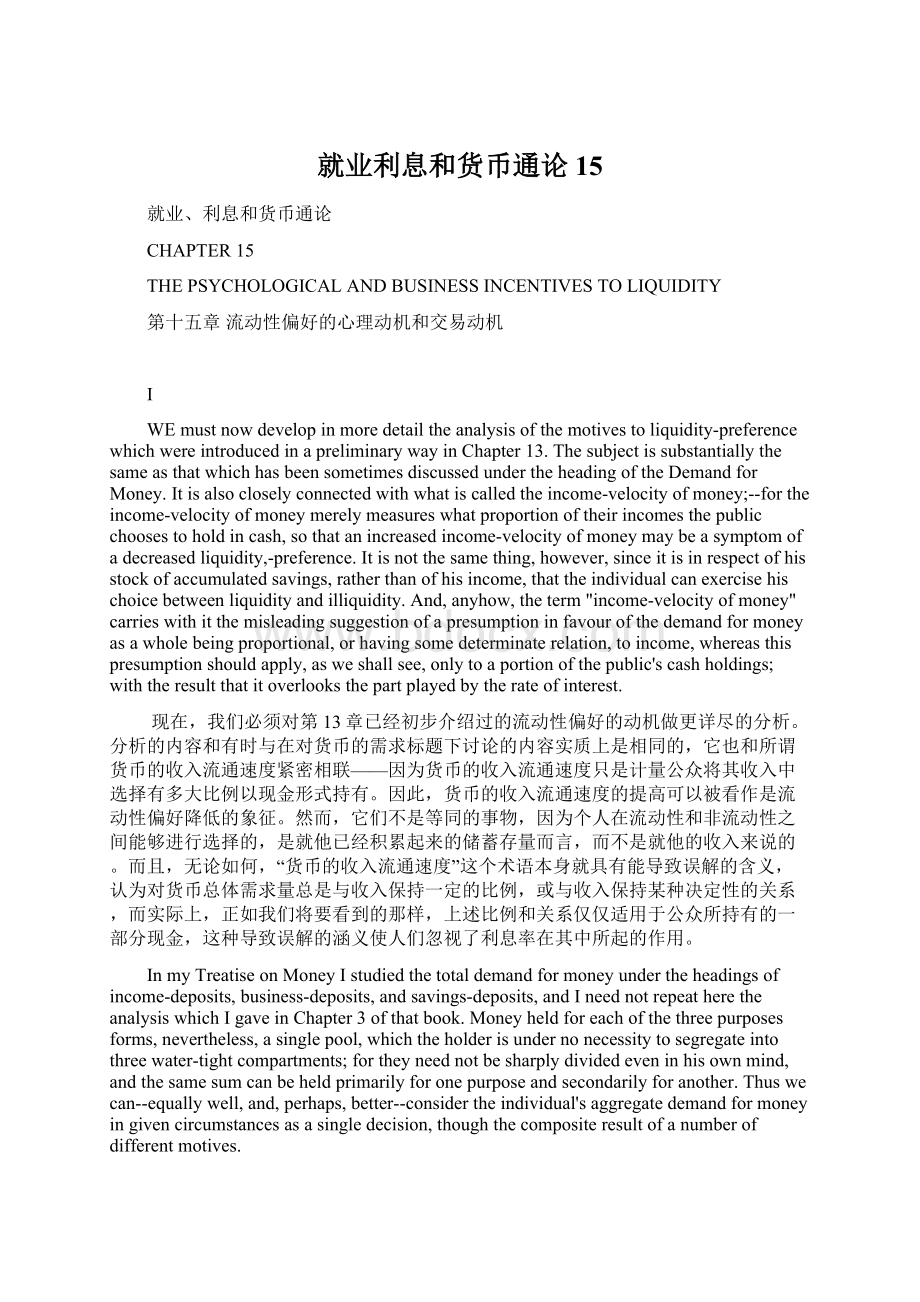就业利息和货币通论 15.docx
《就业利息和货币通论 15.docx》由会员分享,可在线阅读,更多相关《就业利息和货币通论 15.docx(14页珍藏版)》请在冰豆网上搜索。

就业利息和货币通论15
就业、利息和货币通论
CHAPTER15
THEPSYCHOLOGICALANDBUSINESSINCENTIVESTOLIQUIDITY
第十五章流动性偏好的心理动机和交易动机
I
WEmustnowdevelopinmoredetailtheanalysisofthemotivestoliquidity-preferencewhichwereintroducedinapreliminarywayinChapter13.ThesubjectissubstantiallythesameasthatwhichhasbeensometimesdiscussedundertheheadingoftheDemandforMoney.Itisalsocloselyconnectedwithwhatiscalledtheincome-velocityofmoney;--fortheincome-velocityofmoneymerelymeasureswhatproportionoftheirincomesthepublicchoosestoholdincash,sothatanincreasedincome-velocityofmoneymaybeasymptomofadecreasedliquidity,-preference.Itisnotthesamething,however,sinceitisinrespectofhisstockofaccumulatedsavings,ratherthanofhisincome,thattheindividualcanexercisehischoicebetweenliquidityandilliquidity.And,anyhow,theterm"income-velocityofmoney"carrieswithitthemisleadingsuggestionofapresumptioninfavourofthedemandformoneyasawholebeingproportional,orhavingsomedeterminaterelation,toincome,whereasthispresumptionshouldapply,asweshallsee,onlytoaportionofthepublic'scashholdings;withtheresultthatitoverlooksthepartplayedbytherateofinterest.
现在,我们必须对第13章已经初步介绍过的流动性偏好的动机做更详尽的分析。
分析的内容和有时与在对货币的需求标题下讨论的内容实质上是相同的,它也和所谓货币的收入流通速度紧密相联——因为货币的收入流通速度只是计量公众将其收入中选择有多大比例以现金形式持有。
因此,货币的收入流通速度的提高可以被看作是流动性偏好降低的象征。
然而,它们不是等同的事物,因为个人在流动性和非流动性之间能够进行选择的,是就他已经积累起来的储蓄存量而言,而不是就他的收入来说的。
而且,无论如何,“货币的收入流通速度”这个术语本身就具有能导致误解的含义,认为对货币总体需求量总是与收入保持一定的比例,或与收入保持某种决定性的关系,而实际上,正如我们将要看到的那样,上述比例和关系仅仅适用于公众所持有的一部分现金,这种导致误解的涵义使人们忽视了利息率在其中所起的作用。
InmyTreatiseonMoneyIstudiedthetotaldemandformoneyundertheheadingsofincome-deposits,business-deposits,andsavings-deposits,andIneednotrepeatheretheanalysiswhichIgaveinChapter3ofthatbook.Moneyheldforeachofthethreepurposesforms,nevertheless,asinglepool,whichtheholderisundernonecessitytosegregateintothreewater-tightcompartments;fortheyneednotbesharplydividedeveninhisownmind,andthesamesumcanbeheldprimarilyforonepurposeandsecondarilyforanother.Thuswecan--equallywell,and,perhaps,better--considertheindividual'saggregatedemandformoneyingivencircumstancesasasingledecision,thoughthecompositeresultofanumberofdifferentmotives.
在我的《货币论》一书中,我在三个标题下研究了对货币的需求总量,即:
收入存款、经营存款和储蓄存款。
在这里,没有必要重述我在该书第3章中的分析。
然而,为了这三种目的中的每一种而持有的货币都汇集成一笔笼统的款项,持有者不必把它分成严格区分的三个部分,甚至在他们心目中也没有严格区分的必要。
而且,同一笔款项可能主要是为了一种目的而持有,又次要地为了另一种目的而持有。
因此,一般较好的甚或是最好的办法,就是把个人在一定情况下对货币的总需求当作单一的决策,虽然它是由许多不同动机综合而成的结果。
Inanalysingthemotives,however,itisstillconvenienttoclassifythemundercertainheadings,thefirstofwhichbroadlycorrespondstotheformerclassificationofincome-depositsandbusiness-deposits,andthetwolattertothatofsavings-deposits.TheseIhavebrieflyintroducedinChapter13undertheheadingsofthetransactions-motive,whichcanbefurtherclassifiedastheincome-motiveandthebusiness-motive,theprecautionary-motiveandthespeculative-motive.
然而,在分析动机时,在某种标题下把它们分开还是方便的。
第一类大致相当于收入存款和经营存款的区分,后两种类别相当于储蓄存款。
关于这些类别,我曾在第13章中的下述条目中简要地论述过。
这些条目是:
交易动机(这可以进一步区分为收入动机和经营动机)、谨慎动机和投机动机。
(i)TheIncome-motive.—Onereasonforholdingcashistobridgetheintervalbetweenthereceiptofincomeanditsdisbursement.Thestrengthofthismotiveininducingadecisiontoholdagivenaggregateofcashwillchieflydependontheamountofincomeandthenormallengthoftheintervalbetweenitsreceiptanditsdisbursement.Itisinthisconnectionthattheconceptoftheincome-velocityofmoneyisstrictlyappropriate.
(1)收入动机——持有现金的理由之一,是为了在两次取得收入的中间时期作为支付之用。
这一动机在诱使人们作出持有一定数额现金的决策的影响力方面,主要取决于收入的多少以及收入和支付期的长短。
严格地说,货币的收入流通速度这个概念只有在这种场合才是适用的。
(ii)TheBusiness-motive.--Similarly,cashisheldtobridgetheintervalbetweenthetimeofincurringbusinesscostsandthatofthereceiptofthesale-proceeds;cashheldbydealerstobridgetheintervalbetweenpurchaseandrealisationbeingincludedunderthisheading.Thestrengthofthisdemandwillchieflydependonthevalueofcurrentoutput(andhenceoncurrentincome),andonthenumberofhandsthroughwhichoutputpasses.
(2)经营动机——同样,企业也需要持有现金,以在得到销售款之前支付业务开支。
经营者所持有的在进货和销售之间作为支付之用的现金也属于这一种类。
这种需求的强弱程度主要取决于当期产量的价值(从而取决于当期收入)以及销售产品时所需要经过的环节。
(iii)ThePrecautionary-motive.--Toprovideforcontingenciesrequiringsuddenexpenditureandforunforeseenopportunitiesofadvantageouspurchases,andalsotoholdanassetofwhichthevalueisfixedintermsofmoneytomeetasubsequentliabilityfixedintermsofmoney,arefurthermotivesforholdingcash.
(3)谨慎动机——为了应付突然需要支付现金的偶发事件以及意外的有利的购买机会。
为了持有货币价值不变的资产(即货币)以便偿付未来货币价值额不变的债务也是持有现金的另一个动机。
Thestrengthofallthesethreetypesofmotivewillpartlydependonthecheapnessandthereliabilityofmethodsofobtainingcash,whenitisrequired,bysomeformoftemporaryborrowing,inparticularbyoverdraftoritsequivalent.Forthereisnonecessitytoholdidlecashtobridgeoverintervalsifitcanbeobtainedwithoutdifficultyatthemomentwhenitisactuallyrequired.Theirstrengthwillalsodependonwhatwemaytermtherelativecostofholdingcash.Ifthecashcanonlyberetainedbyforgoingthepurchaseofaprofitableasset,thisincreasesthecostandthusweakensthemotivetowardsholdingagivenamountofcash.Ifdepositinterestisearnedorifbankchargesareavoidedbyholdingcash,thisdecreasesthecostandstrengthensthemotive.Itmaybe,however,thatthisislikelytobeaminorfactorexceptwherelargechangesinthecostofholdingcashareinquestion.
以上三种类型动机的强弱,部分地取决于需要现金时以某种暂时借款的方式取得现金的代价的大小和可靠性,特别是银行透支或类似透支方式的代价和可靠性,因为如果需要现金时能毫无困难地取得现金,那么,就没有持有闲置不用的现金的必要。
上述三种动机的强弱程度也取决于被我们称为持有现金的相对成本这一术语。
如果持有现金的代价是牺牲对有利可图的资产的购买,那么,这会减少成本,从而增强持有现金的动机。
然而,除非持有现金的成本会发生很大的变动,这很可能只是一个次要因素。
(iv)ThereremainstheSpeculative-motive.–Thisneedsamoredetailedexaminationthantheothers,bothbecauseitislesswellunderstoodandbecauseitisparticularlyimportantintransmittingtheeffectsofachangeinthequantityofmoney.
(4)还剩下的是投机动机——这个动机比其他动机需要进行更详尽的考察。
这一是因为人们对这个动机缺乏充分的理解,二是因为货币数量的改变所导致的后果具有特殊的重要性。
Innormalcircumstancestheamountofmoneyrequiredtosatisfythetransactions-motiveandtheprecautionary-motiveismainlyaresultantofthegeneralactivityoftheeconomicsystemandofthelevelofmoney-income.Butitisbyplayingonthespeculative-motivethatmonetarymanagement(or,intheabsenceofmanagement,chancechangesinthequantityofmoney)isbroughttobearontheeconomicsystem.Forthedemandformoneytosatisfytheformermotivesisgenerallyirresponsivetoanyinfluenceexcepttheactualoccurrenceofachangeinthegeneraleconomicactivityandthelevelofincomes;whereasexperienceindicatesthattheaggregatedemandformoneytosatisfythespeculative-motiveusuallyshowsacontinuousresponsetogradualchangesintherateofinterest,i.e.thereisacontinuouscurverelatingchangesinthedemandformoneytosatisfythespeculativemotiveandchangesintherateofinterestasgivenbychangesinthepricesofbondsanddebtsofvariousmaturities.
在正常情况下,满足交易动机和谨慎动机所需要的货币数量,只是经济体系的通常活动和货币收入水平的结果。
然而,正是由于能利用投机动机的作用,所以对货币数量的控制(或者是在不施加控制的情形中,货币数量的自我变动)才能对经济制度施加影响,因为,由于为满足前两个动机而引致的对货币的需求,除去对通常的经济活动和收入水平的变动的实际反应之外,一般不受任何其他影响。
而经验指出:
满足投机动机而引致的货币需求总量,却常常表现出随着利息率的逐渐变动而不断地变化。
也就是说,存在一条连续的曲线,它显示出:
满足投机动机对货币需求量的变动和由债券价格的变动与不同期限的债务所决定的利息率变动之间的关系。
Indeed,ifthiswerenotso,"openmarketoperations"wouldbeimpracticable.Ihavesaidthatexperienceindicatesthecontinuousrelationshipstatedabove,becauseinnormalcircumstancesthebankingsystemisinfactalwaysabletopurchase(orsell)bondsinexchangeforcashbybiddingthepriceofbondsup(ordown)inthemarketbyamodestamount;andthelargerthequantityofcashwhichtheyseektocreate(orcancel)bypurchasing(orselling)bondsanddebts,thegreatermustbethefall(orrise)intherateofinterest.Where,however,(asintheUnitedStates,1933-1934)open-marketoperationshavebeenlimitedtothepurchaseofveryshort-datedsecurities,theeffectmay,ofcourse,bemainlyconfinedtotheveryshort-termrateofinterestandhavebutlittlereactiononthemuchmoreimportantlong-termratesofinterest.
诚然,如果不存在这种关系,则“公开市场业务”就不可能实行。
我已指出,经验已经表明存在上述具有连续性的关系,理由在于:
在正常情况下,整个银行制度实际上总能够在市场上通过少量提高(或降低)债券价格来购买(或售出)债券以换取现金。
银行制度想要通过购买(或售出)债券或债务而创造(或吸纳)的现金数量越多,利息率的下降(或上升)就越大。
当然,在公开市场业务的买卖仅限于期限很短的债券的地方(或1933-1934年间的美国),它的影响主要限于期限很短的利息率,而对更为重要的长期利息率只具有很小的影响。
Indealingwiththespeculative-motiveitis,however,importanttodistinguishbetweenthechangesintherateofinterestwhichareduetochangesinthesupplyofmoneyavailabletosatisfythespeculative-motive,withouttherehavingbeenanychangeintheliquidityfunction,andthosewhichareprimarilyduetochangesinexpectationaffectingtheliquidityfunctionitself.Open-marketoperationsmay,indeed,influencetherateofinterestthroughbothchannels;sincetheymaynotonlychangethevolumeofmoney,butmayalsogiverisetochangedexpectationsconcerningthefuturepolicyoftheCentralBankoroftheGovernment.Changesintheliquidityfunctionitself,duetoachangeinthenewswhichcausesrevisionofexpectations,willoftenbediscontinuous,andwill,therefore,giverisetoacorrespondingdiscontinuityofchangeintherateofinterest.Only,indeed,insofarasthechangeinthenewsisdifferentlyinterpretedbydifferentindividualsoraffectsindividualinterestsdifferentlywillthereberoomforanyincreasedactivityofdealinginthebondmarket.Ifthechangeinthenewsaffectsthejudgmentandtherequirementsofeveryoneinpreciselythesameway,therateofinterest(asindicatedbythepricesofbondsanddebts)willbeadjustedforthwithtothenewsituationw